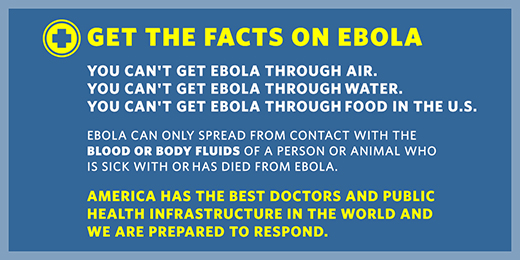Questions and Answers on Ebola
Q: What is Ebola?
A: Ebola virus is the cause of a viral hemorrhagic fever disease. Symptoms include: fever, headache, joint and muscle aches, weakness, diarrhea, vomiting, stomach pain, lack of appetite, and abnormal bleeding. Symptoms may appear anywhere from 2 to 21 days after exposure to Ebola virus though 8-10 days is most common.
Q: How is Ebola transmitted?
A: Ebola is transmitted through direct contact with the blood or bodily fluids of an infected symptomatic person or though exposure to objects (such as needles) that have been contaminated with infected secretions.
Q: Can Ebola be transmitted through the air?
A: No. Ebola is not a respiratory disease like the flu, so it is not transmitted through the air.
Q: Can I get Ebola from contaminated food or water?
A: No. Ebola is not transmitted through food in the United States. It is not transmitted through water.
Q: Can I get Ebola from a person who is infected but doesn’t have any symptoms?
A: No. Individuals who are not symptomatic are not contagious. In order for the virus to be transmitted, an individual would have to have direct contact with an individual who is experiencing symptoms or has died of the disease.
Learn more:
- Get more information from the CDC on Ebola virus disease on topics including: transmission, diagnosis, signs and symptoms, treatment, risk of exposure, and prevention
- Stay up-to-date on the current Ebola outbreak by following @CDCemergency on Twitter
- Get a readout of the President’s call with CDC Director Dr. Tom Frieden
From the White House Blog





